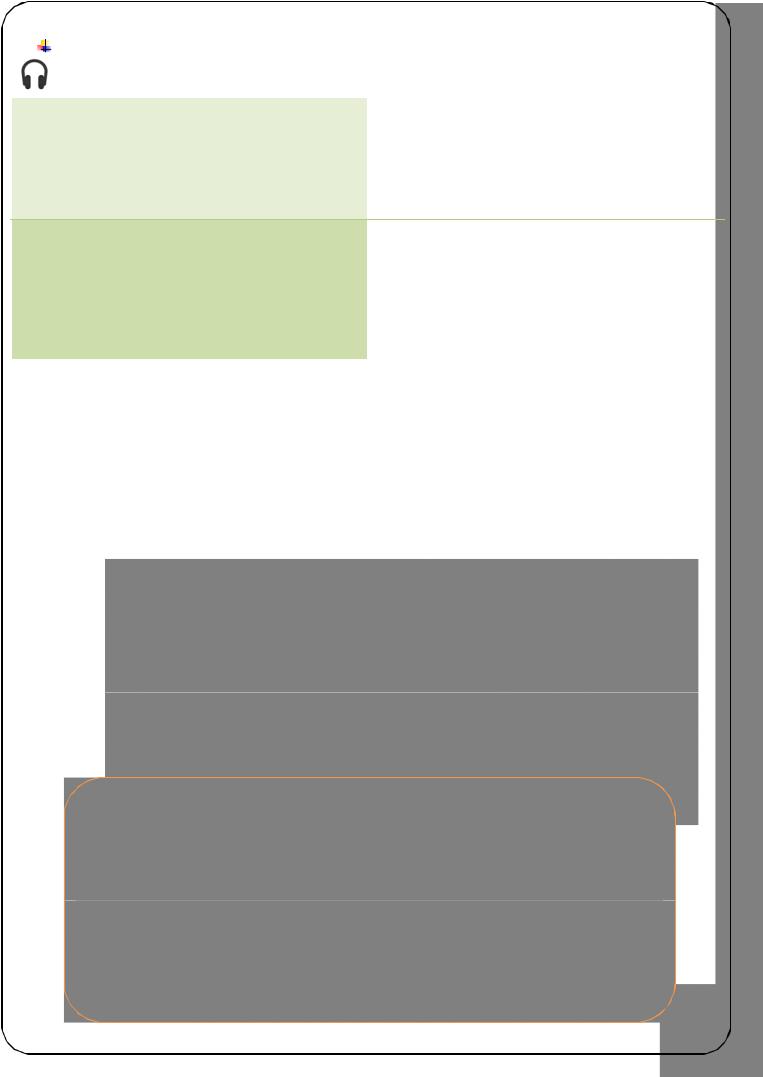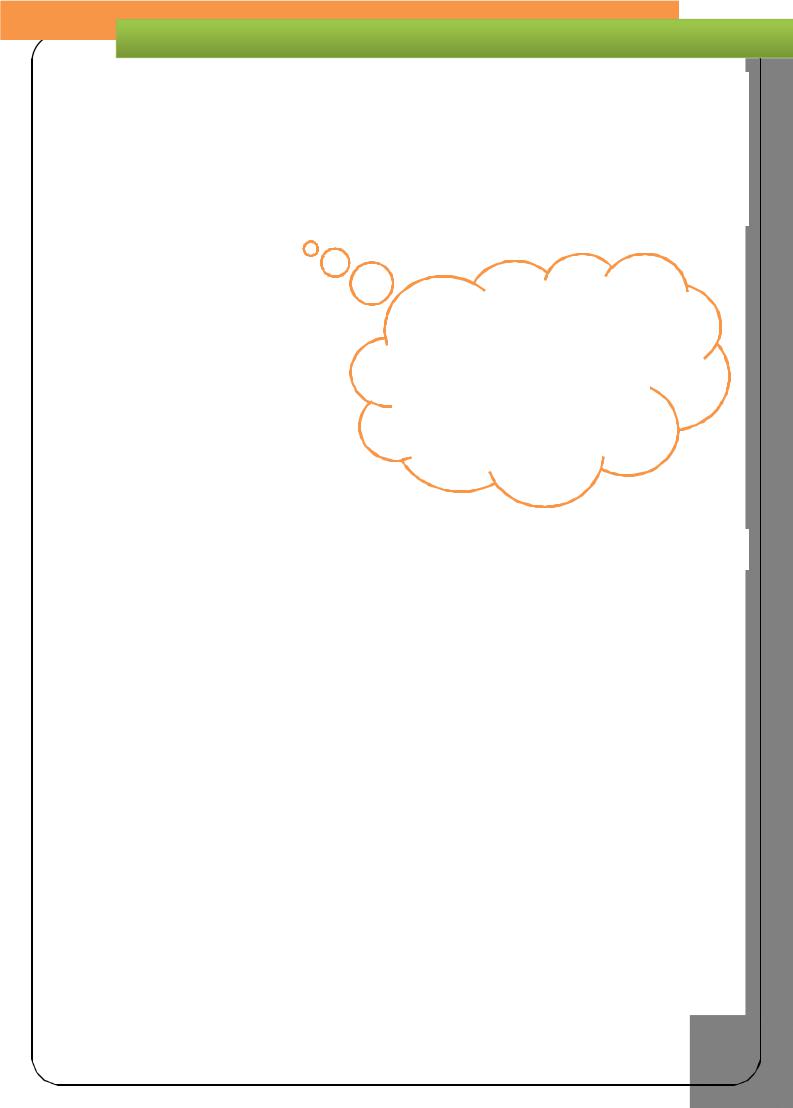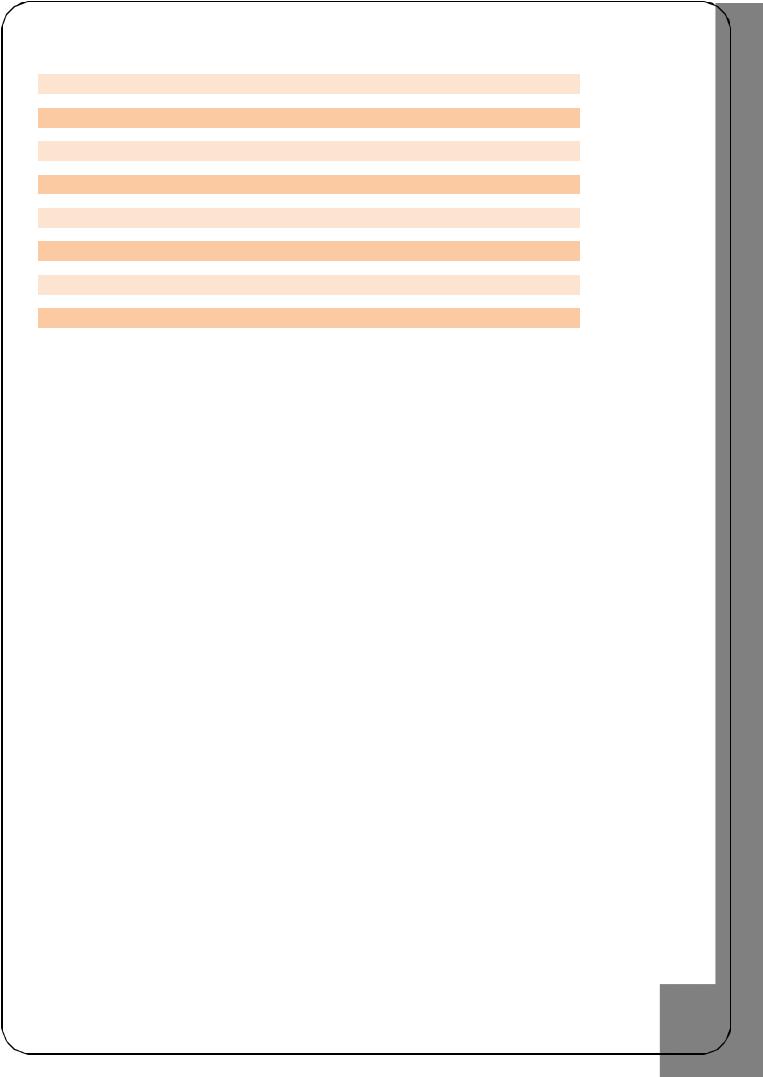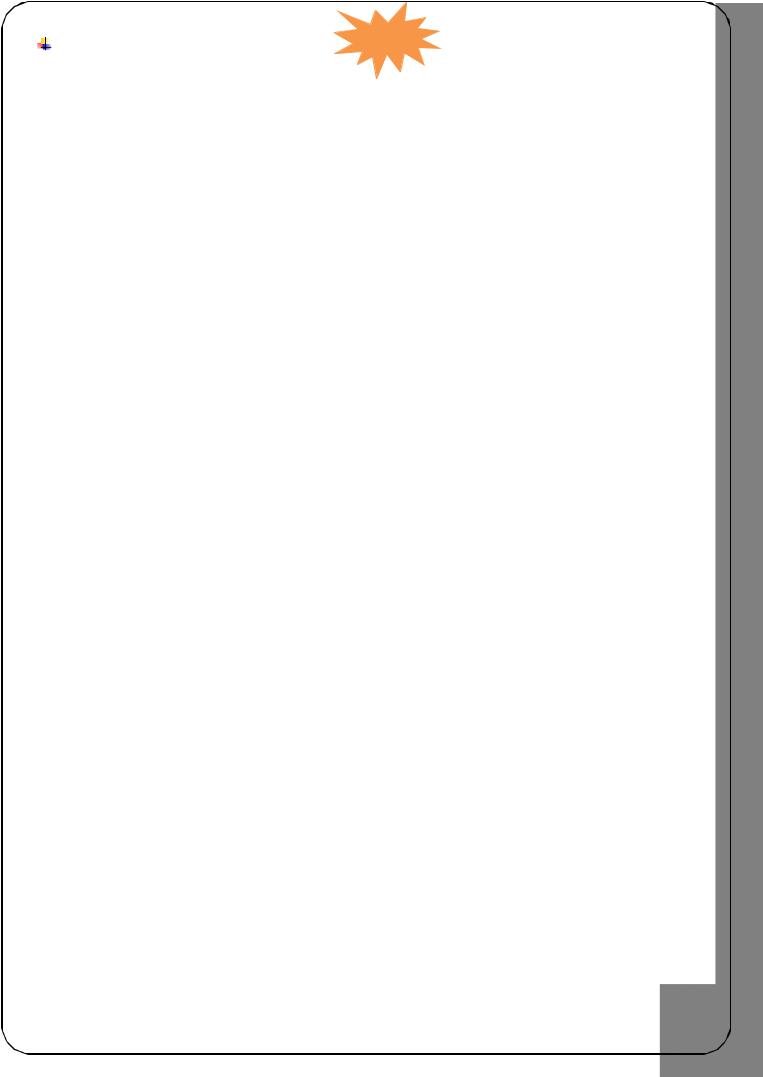
Unit_2
.pdf
Ex. 20 Now listen to the recording about heli-skiing. For questions 1-6, choose the right answer - A, B, C or D.
1. Keithfeelsheli-skiing shouldnot be permitted |
|
4. Keithagrees with Helena that |
||||
in theUKbecause |
|
a. |
heli-skiing represents an environmental threat. |
|||
|
many people have been killed. |
|
||||
a. |
|
b. |
||||
b. |
|
c. |
the dangers at home are just as great. |
|||
c. |
heliskiers are too far from help. |
|
d. |
other extreme sports are not as risky |
||
d. |
it is banned elsewhere. |
|
|
the risk of avalanche is fairly minimal |
||
2. |
weather conditions are unsuitable |
|
|
|
|
|
|
|
|
|
|||
|
Keithsays that themost important choiceto |
|
5. What does Keithdescribeas difficult toforesee? |
|
||
maketoensuresafetywhen skiing is that of |
|
|
|
|
||
|
the slope. |
|
a. |
snow quality |
|
|
a. |
|
b. |
weatherconditions |
|
||
b. |
|
c. |
wildlifeactivity |
|
||
c. |
your companions. |
|
d. |
dangerlevels |
|
|
d. |
your equipment. |
|
|
|
|
|
|
the helicopter |
|
|
|
|
|
3. Helena argues that thelocations heliskiers use |
|
|
6. Helena is worriedthat |
|||
are |
|
|
a. |
|
|
|
a. |
prone to avalanches. |
|
|
people take unnecessary risks. |
||
b. |
|
|
b. |
|||
c. |
very close to resorts. |
|
|
c. |
danger is subjectively assessed. |
|
d. |
not as steep as stairs |
|
|
d. |
other sports may be banned. |
|
|
generally fairly safe. |
|
|
|
skiing might get a bad name. |
|
|
|
|
|
|
|
|
 Ex. 21 Listen again and complete the sentences below.
Ex. 21 Listen again and complete the sentences below.
1.Other countries have already... … …… … the sport, like France for instance.
2.The ... … …… … of a heliskier being caught in an avalanche are 1 in 175,000.
3.First of all, France banned the sport notonlyforecological reasons but for ...… …… … too.
4.Even wild animals are some of the dangers that you may have to ... … …… … .
5.I think measuring the degree of danger ...… … …… in a sport is very difficult.
6.Risking human life for... … …… … is, in my view, quite irresponsible.
|
Active Vocabulary |
|
|
risk/risky |
to risk sth |
to find outlets FOR sth |
the odds (=chances) |
danger/dangerous |
to endanger sth |
to push the limits |
sheer folly |
challenge/challenging |
to challenge |
to seek (excitement) |
safety-counscious |
thrill/thrilling |
to thrill |
to have an effect ON |
|
appeal/appealing |
to appeal TO sb |
to ban (extreme sports) |
|
exhilaration/exhilarating to exhilarate sb |
to involve (danger) |
|
|
damage (to cause ~) |
to damage |
to face (risk/danger) |
|
safety/safe |
safety measures |
to play ON the edge |
|
hazard/hazardous |
safety cameras |
to engage IN (sports) |
|
40
Unit 2: Student’s Book

Hometask 2
 Ex. 22 Study the active vocabulary (Quiz 2).
Ex. 22 Study the active vocabulary (Quiz 2).
 Ex. 23 Complete the sentences below with forms of the words on the right.
Ex. 23 Complete the sentences below with forms of the words on the right.
|
1. |
Tap water in the area is…………… to drink as it is too dirty. |
|
SAFE |
|
|
|
||
|
2. |
The giant panda is an …………… species. |
|
DANGER |
|
|
|
||
|
3. |
I wanted a job that was more …………… . |
|
CHALLENGE |
|
|
|
||
|
4. |
He had ignored their…………… to stay in the car. |
|
WARN |
|
|
|
||
|
5. |
Vets took …………… to prevent the spread of the disease. |
|
CAUTION |
|
|
|
||
6. |
Mark engages in …………… activities such as skydiving and motocross |
RISK |
||
|
|
racing. |
|
|
|
|
|
ADVENTURE |
|
|
7. |
He had always wanted an …………… life in the tropics. |
|
|
|
8. |
I don't want to …………… you, but I don't think it's such a good idea. |
|
COURAGE |
|
|
|
||
|
|
|
|
|
 Ex. 24 Study the note and underline the correct adjective in italics.
Ex. 24 Study the note and underline the correct adjective in italics.
E.g.:It's a reallyexhilarating experience being there. I can't wait to go in every day.
The adjective exhilarating comes from the verbexhilarate. There are two types of adjectives that can be made from the verb:
•Verb + -ing:exhilarating Somethingisexhilarating if it makes me feelexhilarated.
•Verb + -ed:exhilarated I feelexhilarated because something is exhilarating.
1.Do you find sports like mountaineering and parkour thrilling/thrilledto watch?
2.Do you think people get irritating/irritatedby the constant encouragement to do something physical?
3.Why do you think people areinteresting/ interestedin extreme sports?
4.Do you think sports stars are asmotivating/motivatedfor young people now as in the past?
5.What makes funfair rides like roller coastersexciting/excited?
6.Are you the sort of personwho considers sportsprogrammes on TVannoying/annoyed, or do you get annoying/annoyedby other types of programmes?
7.Do you think extreme sports are morechallenging/challengedthan other sports?
8.Do you feel invigorated/invigoratingwhen you do any type of energetic activity?
Choose three questions and answer themquestions. Give reasons and examples in your answers.
 Ex. 25 Do ex. 29.
Ex. 25 Do ex. 29.
41
Unit 2: Student’s Book

 Ex. 26 Put the extract into Russian. EXAM
Ex. 26 Put the extract into Russian. EXAM
Экстремальные виды спорта получают все большую популярность. С чем это связано? С тем ли, что сейчас появилось достаточно много возможностей для осуществления своих желаний? Или может со все убыстряющимся темпом нашей жизни?
Часто можно услышать мнение, особенно от людей, которые экстримом не увлекаются, что поклонникам такого спортатребуется помощь психолога. Что риск – это способ решения своих личностных проблем. Но так ли это? И всегда ли стремление к риску и выбросу адреналина – это признак того, что человеку требуется психологическая консультация?
Так как специалисты начали изучать данный вопрос относительно недавно, то нет точных взглядов на эту проблему. В каждом случае необходимо подходить к решению вопроса индивидуально, обращая внимание не только на сами поступки, но и на мотивы, ведущие к их совершению. Всех поклонников экстрима можно разделить две большие группы. В первую входят те, кто стремиться получить острые ощущения, но совершенно не стремиться рисковать своей жизнью. Ведь это только со стороны, на взгляд непосвященного человека, любые экстремальные виды спорта кажутся очень опасными. А те, кто занимается ими постоянно, говорят о том, что опасность не намного выше, чем при занятиях традиционными видами спорта. Ведь травму можно получить и играя в футбол, а не только прыгая с парашютом. Здесь огромное значение имеет подготовка и тренировки. Подготовленный спортсмен четко знает, что нужно делать в любой нестандартной ситуации.
Вторая группа любителей адреналина – это те, кто сознательно идет на риск. Именно такие люди выбирают профессии связанные с риском для жизни. Они понимают всю их опасность, но, к сожалению, не все и не всегда делают этот выбор сознательно. Особенно часто это относится к подросткам. Именно они способны чаще всего на бессмысленный риск. И вот здесь-то помощь психолога действительно необходима. Если взрослый человек сознательно рискует своей жизнью, понимая, зачем и для чего он это делает, представляя, как можно избежать негативных для своей жизни последствий, то подросток с неустойчивой психикой подчас действует лишь под влиянием эмоций. И помощь тут требуется не только ему, но и в первую очередь его родителям, так как склонность ребенка к бессмысленному риску может быть признаком семейных проблем, на которыене обращают внимания.
Экстремальный спорт – это возможность проявить себя, выплеснуть накопившийся стресс, реализовать свои скрытые способности, максимально выйти за пределы возможностей обычного человека и понять свой внутренний мир. Но только тогда, когда цель осознана, а риск тщательно просчитан. Бессмысленные же рискованные поступки – это повод обратиться к специалисту.
Unit 2: Student’s Book
42

Theme Two: All Part of the Job
 Ex. 27 Write Quiz 2, check ex. 22-25. A brief recap of the previous lesson.
Ex. 27 Write Quiz 2, check ex. 22-25. A brief recap of the previous lesson.
 Ex. 28 Discuss.
Ex. 28 Discuss.
1.Which of the problems/benefits would you associate with each of the following occupations? In what situations?
2.What mightrewards and advantages include?
airline pilot
construction worker
school bus driver
football manager |
Surgeons have quite high social |
|
status; however, they are under a |
||
|
newspaper reporter |
|
|
lot of stress, which is caused by |
|
|
solicitor |
the responsibility they bear, since |
|
war correspondent |
the lives of their patients are in |
|
investment consultant |
their hands. |
|
army officer |
|
|
|
|
 Ex. 29 Before reading the text, match the words and phrases listed below to their Russian equivalents.
Ex. 29 Before reading the text, match the words and phrases listed below to their Russian equivalents.
1. |
called out to traffic accidents |
a. |
выплачивать ипотеку |
2. |
my foremost thought |
b. |
передвигаться с помощью костылей |
3. |
to pass out |
c. |
уход с работы |
4. |
complete withdrawal from their |
d. |
изможденный, истощенный |
5. |
work |
e. |
вызвать на место аварии |
a caring profession |
f. |
много трудностей, проблем |
|
6. |
mobile with crutches |
g. |
|
7. |
in excess of a hundred hours a week |
h. |
первая мысль |
8. |
to be a heavy burden |
i. |
потерять сознание |
9. |
nebulous rewards |
j. |
решение еще не принято |
10.a mountain ofhassles |
k. |
помогающая профессия (педагог, медик, |
|
11.the balance remains tipped |
l. |
соцработник и т.п.) |
|
12.to pay the mortgage |
более 100 часов в неделю |
||
13.burnt out |
m. |
быть тяжелой ношей |
|
14.The jury is still out |
n. |
||
43
Unit 2: Student’s Book

Hazard at Work
I was nearly killed on Boxing Day. My job nearly got me killed. To start with, it was not a serious incident: one car off the road and 5 two very shocked but not terribly injured passengers. I was giving assistance that is my job: rural GPs2 are often called out
sometimes get there first and often help the ambulance crews prepare patients for a long journey to hospital.
The next car down the road changed it all. I saw it coming and had time to think: surely it will stop. I remember the noise as hit me. No pain at this stage. I was tossed across the road and scrambled up on to the verge. Straightaway I knew that my was broken. Well, that's my job too. Still no pain. I didn't want to die, that was my foremost thought. I didn't want to die here
on the roadside, so I worried about bleeding to death, about internal injury. I waited for the signs of shock and triednot to pass out.
The scene was now full of shouting and crying. No one seemed to notice me. The village bobby arrived on cue. Sure my legwas broken, but I wasn't going to die. Now it hurt.
'Burn out' sums up how anyone in a caring profession can end up responding to chronic job-related stress by loss of concern and complete withdrawal from their work. GPs are not immune. Well, I suffered a ‘flash out’. Nothing chronic about this stress. Suddenly, lying there on the roadside with a smashed-up leg, it didn't seem worth it any more.
That was three months ago. I'm still only mobile with crutches. The practice has carried on without me - which is how it should be, for no one is indispensable in a good system. I don't need to be a doctor for a while. My patients kindly showed their concern and wished me well while they took their problems to the locum3.
Because I have spent nearly nine years working often in excess of a hundred hours a week, everyone assumes my enforced idleness to be a heavy burden. It isn't. I'm more concerned that I'm not missing my work and that I'm certainly not bored. Does this mean that I don't need to be the doctor permanently?
I know why I like being a GP. I live in a good place and I work for myself. I'm responsible only to my patients, myself and my partner. It is probably useful. It involves practicing a set of skills that could never be perfected and so is always a challenge. My staff and local colleagues are good company. It pays well. I get home for lunch every day.
The more nebulous rewards, so the sort of things many non-doctors think we do it for - like being in a position to 'help people' - tend to be counter-balanced by the reasons I don't like the job. I get used. I have to try to help with problems that should never have come my way, to which the solutions are invariably political and not medical. I cannot prescribe jobs or better houses or better relationships. I can try to be supportive, but just a few patients can create a mountain of hassles. I'm sometimes over-committed and frequently over-tired. Stress is an everyday problem. My job nearly got me killed.
Three days after I was admitted to hospital my wife went into a different hospital and had our second baby. It is impossible for me to express how unhappy my unforeseen absence made me. I couldn't
decide whether to blame the accident (but accidents happen) or my job (but no job is without risk) or just to assume no blame.
2GP -врачобщей практики[общего профиля] (врачширокого профиля в отличие от врачаузкой специализации; оказывает общуюмедицинскую помощь, ав случаенеобходимости направляетпациентов к врачам-специалистам в определенной области; обычновыступаетв ролисемейного доктора)
3locum -сокращение отлатинскогоlocum tenens (занимая место) иупотребляется как существительное, обозначаяврача илисвященника, который
временно исполняет обязанности другого вовремя его отсутствия |
44 |
|
Unit 2: Student’s Book

Well, the balance remains tipped. Despite the apparent no usefulness of being a GP and the satisfaction it gives me, I have discovered that the only certain reason I do it is for my family. Along with paying the mortgage, it allows us to live how and
where we like.
Everyone in a caring profession knows that if they do not ration their caring they can end up emotionally and intellectually burnt out. They separate themselves from their families by giving too much. I suppose I'm still bitter because there are few precautions I could take to avoid the way I was almost permanently separated from my family - and at such an important time. My resolve
has been questioned. Do I need to be a doctor?The jury is still out.
Stephen Singleton, The Guardian
Answerthefollowing questions using thewords in italics:
1.Why are rural GPs often called out to traffic accidents? (injure, assistance)
2.How does a doctor respond tochronic job-relatedstress? (suffer, risk)
3.How do the writer’s patientsdo without him?
4.What really positive reasons does the writer find for being a doctor? (involve, challenge, face, appeal)What reasons counter-balance good points? (burn out,stress)
5.What is the certain reason discovered by the writer to be a GP?
6.Why is it necessary for doctors and nurses to limit emotional involvement in their work? (burn out)
7.Why might the writer decideto give up being a doctor in the future?
 Ex. 30 Translate into Russian. Pay attentionto the highlighted words.
Ex. 30 Translate into Russian. Pay attentionto the highlighted words.
1.'Burn out' sums up how anyone in a caring profession can end up responding to chronic jobrelated stress by loss of concern and complete withdrawal from their work. GPs are not immune.
2.It involvespracticinga set of skills that could never be perfected and so is always achallenge.
3.I can try to be supportive, but just a few patients can create a mountain of hassles.
4.I'm sometimesover-committedand frequently over-tired.
5.It is impossible for me to express how unhappymy unforeseenabsence made me.
6.Everyone in a caring profession knows that if they do not ration their caring they can end up emotionally and intellectually burnt out.
7.I suppose I'm still bitter because there are few precautions I could take to avoid the way I was almost permanently separated from my family.
|
ACTIVE VOCABULARY |
|
occupation |
to suffer from sth |
responsible |
occupational hazard |
to involve (stress) |
unforeseen |
injury |
to blame |
committed |
job-related (stress) |
to appeal to sb |
challenging |
challenge |
to experience |
|
consequence |
to face (the consequences) |
|
precaution |
to support |
|
45
Unit 2: Student’s Book

Hometask 3
 Ex. 31 You will hear a firefighter talking about his work. Before you listen,
Ex. 31 You will hear a firefighter talking about his work. Before you listen,  think of the following.
think of the following.
1.What sort of person would make a good firefighter? (qualities)
2.What do you think might be the main advantages and disadvantages of being a firefighter)
Now listen to the recording. For questions 1-8. complete the notes by filling in the gaps with a word or short phrase. You will hear the recording only once.
 : Nigel Dawson - Firefighter
: Nigel Dawson - Firefighter
Recruitment procedure:
Vocational tests to assess:
•physical fitness
• _________________________________ for the job
_________________________________ for the job
Main attractionsof the job:
• _________________________________
_________________________________
• _________________________________
_________________________________
Main disadvantage:
Pay is lower than • _________________________________
_________________________________
Present salary: •  _________________________________
_________________________________
Perks
• _________________________________
_________________________________
•pension
•health cover
• _________________________________
_________________________________
Promotion:
•  _________________________________ prospects
_________________________________ prospects
Unit 2: Student’s Book
46

 Ex. 32 Complete the sentences below with forms of the words on the right.
Ex. 32 Complete the sentences below with forms of the words on the right.
|
1. |
We were so …………… to hear about the baby. |
|
THRILL |
|
|
|
||
|
2. |
She was taken to hospital with aserious head …………… . |
|
INJURE |
|
|
|
||
|
3. |
Mr Brown was found guilty of…………… driving. |
|
NEGLECT |
|
|
|
||
|
4. |
The official…………… toll stands at 53. |
|
DIE |
|
|
|
||
|
5. |
It’S hard to assess the …………… effects of sunlight. |
|
DAMAGE |
|
|
|
||
|
6. |
The damage done to his property was…………… . |
|
NEGLECT |
|
|
|
||
|
7. |
…………… sportinvolves a relatively high risk ofinjury. |
|
PROFESSION |
|
|
|
||
|
8. |
Extreme sports is growing in…………… . |
|
POPULAR |
|
|
|
||
9. |
I can only wonder at the…………… of people who advocate such |
RESPONSIBLE |
||
|
|
destruction to our environment. |
|
|
 Ex. 33 Translate into English.
Ex. 33 Translate into English.
a.Риск – явление обычное и банальное. Мыидем на осознанный риск, когда едем в машине, садимся на диету, занимаемся спортоми пользуемся электроприборами.
b.Полиция подтвердила, что, по крайней мере,26человек погибли, и более 200 было ранено, когда произошло столкновение двух пассажирских поездов. Если подтвердятся самые худшие опасения официальных лиц,количество убитых, вероятно, вырастет.
c.Пренебрежение техникой безопасности- весьма опасное отношение к делу. Так можно навлечь беду. На вашем месте я бы не подвергаллюдей риску. Нужно принять все меры предосторожности.
d.Похоже, что для политиков развод и алкоголизм считаютсяпрофессиональным риском. История знает много случаев, когдана карту ставилась репутация и
карьера. Некоторые, искушая судьбу, выходили сухими из воды, другие вели себя неосторожно и поплатились за это не только карьерой, но и поставили под угрозу жизнь своих близких.
e.Он очень ответственный сотрудник, которому можно поручить дажеочень сложное задание.
Unit 2: Student’s Book
47

Brush Up
 Ex. 34 Check ex. 39-42, Quiz 3.
Ex. 34 Check ex. 39-42, Quiz 3.
 Ex. 35 Translate into Russian.
Ex. 35 Translate into Russian.
1.The earthquake claimed sixty lives.
2.The woman claimed to have seen the accident with her own eyes.
3.No one challengedthe assumptions that are made in the report.
4.The difficultyof putting our ideas into practicechallengedus tofind a new method.
5.You’ve been neglecting yourwork.
6.It was negligence of the doctor that he failed to give the woman a full examination.
7.If you behave so foolishly you must be ready to take consequences.
8.He may be a man of consequence there, but he’s nobody here.
9.At our school we take an individual approach to every pupil.
10.When is the best timeto approach him aboutan increase in salary?
11.She may pass the exam but the odds are thatshe will fail.
12.Against all the oddshe recovered from his illness.
 Ex. 36 Translate into English using the following verbs.
Ex. 36 Translate into English using the following verbs.
claim |
neglect |
face |
challenge |
approach |
involve |
1.Наводнение унесло сотни жизней.
2.В данном деле необходим творческий подход.
3.Ее муж умер во время операции, и ей потребовалось три года, чтобы доказать, что это была халатность медицинского персонала.
4.Власти заявляли, что шансы найти тех, кто выжил после кораблекрушения, незначительны.
5.Если ты нарушил закон, то будь готов нести ответственность за последствия.
6.Его новая работаподразумевает постоянные командировки.
7.Он обратился ко мне за сведениями, но мне было запрещено говорить что-либо.
8.Из-за работы он совсем забросил семью. В конечном итоге его жена подала на развод.
9.Даже просто выжить было подвигом.
 Ex. 37 Underline the correct preposition in italics.
Ex. 37 Underline the correct preposition in italics.
1. |
We must stop these rumours; the firm’s reputation is |
in/at/on |
risk. |
|
|||||||||||||||
2. |
My flatmates want to have a party, but I’m not keen |
on/at/for |
the idea. |
|
|||||||||||||||
3. |
The idea of working abroad really appeals |
to/on/for |
me. |
|
|
|
|
||||||||||||
4. |
Their economy is |
in/on/at |
the edge of collapse. |
|
|
|
|
|
|
|
|
||||||||
5. |
My parents’ divorce had a big effect |
on/at/to |
me. |
|
|
|
|
|
|
|
|||||||||
6. |
Is football a goodoutlet |
on/for/to |
men’s aggression? |
|
|
|
|
|
Book |
||||||||||
7. |
I realized he was suffering |
of/from/on |
shock. |
|
|
|
|
|
|
|
|
|
|||||||
|
|
|
|
|
|
|
|
|
|
|
|
|
|||||||
8. |
Only 10% of American adults engage |
at/to/in |
regular exercise. |
|
Unit 2: Student’s |
||||||||||||||
9. |
Police believe that the same man is responsible |
to/for/in |
three other murders in the area. |
||||||||||||||||
|
|
|
|
||||||||||||||||
|
|
|
|
|
|
|
|
|
|
|
|
|
|
|
|
|
|
|
|

Ex. 38 Put the textinto English. |
EXAM |
|
Риск в бизнесе понятен и является непременным атрибутом. Развитие производства без экспериментов невозможно. Бизнесмен в состоянии все контролировать, делать расчеты, прогнозировать результаты.
Экстремальные виды спорта, бизнес, бесспорно, подразумевают риск. Но от этого риска человек вправе отказаться. Совершенно иное дело — профессиональный риск. Здесь риск — неотъемлемая составляющая профессии. Никто не заставляет спасателей подвергать себя опасности. Это их работа. Они должны уметь хорошо ориентироваться в пространстве, координировано управлять машиной, включая нелогичные, необычные моменты, сохранять самообладание. Высокий уровень профессионализма минимизирует риск.
Откуда берутся склонные к риску люди? Как все мы — из детства. Способность идти на риск — результат сложной суммы множества факторов. Наследственность, особенности воспитания, природная и социальная среда - вот главные из них. Педагоги и психологи давно подметили, что если ребенок воспитывался в спокойной и бесконфликтной обстановке, имел достаточную степень самостоятельности, ощущал одобрение и поддержку родителей, то он вырастал более уверенным в своих силах, смелым и предприимчивым человеком.
И наоборот, ребенок, выросший в обстановке страхов и тревог, нестабильности, лишенный самостоятельности или постоянно подвергающийся наказаниям, скорее всего, станет тревожным, неуверенным, безынициативным человеком с чувством вины.
Ситуация риска всегда порождает стресс, и от того, как человек справляется с ним, будет зависеть эффективность его деятельности, а иногда и жизнь.
Readers’ Digest
октябрь 2002
 Ex. 39 Discuss.
Ex. 39 Discuss.
1.Think about the dangers and risks people livingin big cities face. Discuss with your partner.
2.Draw up a list of main hazards of citylife.
 Ex. 40 You are going to listen totwo friends talking about the city they live in. Before listening, match the words and phrases listed below to theirRussian equivalents.
Ex. 40 You are going to listen totwo friends talking about the city they live in. Before listening, match the words and phrases listed below to theirRussian equivalents.
1. |
sensible |
a. |
вор-карманник |
2. |
a spate of muggings |
b. |
уязвимый; ранимый |
3. |
to snatch a wallet |
c. |
легкая мишень |
4. |
a pickpocket |
d. |
благоразумный, осторожный |
5. |
to be worth doing |
e. |
нанести удар ножом |
6. |
to stab sb |
f. |
волна уличных нападений |
7. |
an easy target |
g. |
отпугивать |
8. |
vulnerable |
h. |
стащить, украсть кошелек |
9. |
to put sb off |
i. |
стоит что-л. делать |
49
Unit 2: Student’s Book
